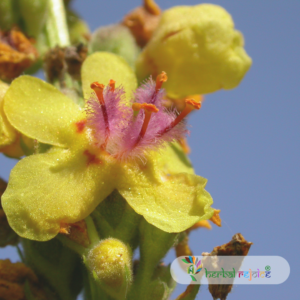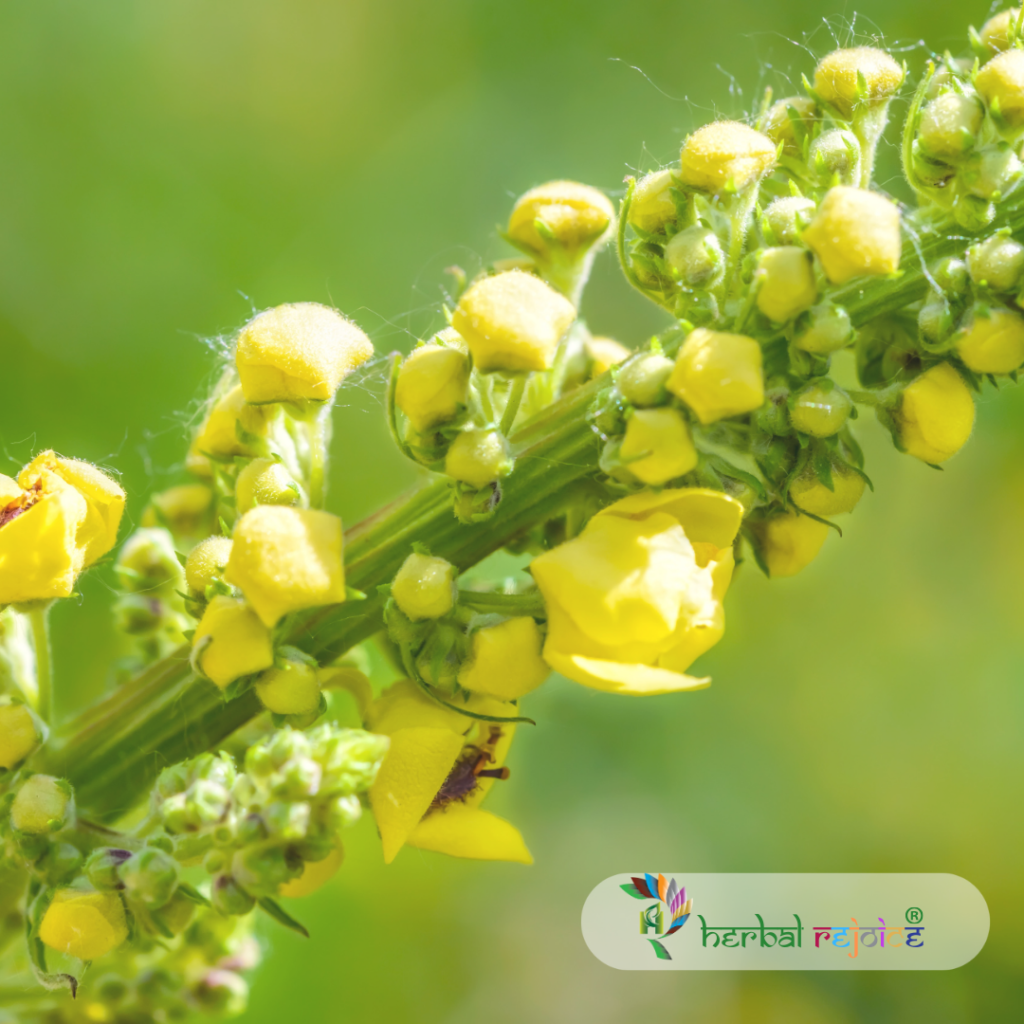Introduction
Cow’s Lungwort, scientifically known as Verbascum thapsus Linn. (synonym V. phlomoides L.), is a herbaceous plant belonging to the family Scrophulariaceae. It is native to the temperate regions of the Himalayas, Western Ghats, and the Nilgiris.
In English, it is commonly referred to as Common Mullein or Cow’s Lungwort, although Large-flowered Mullein is sometimes confused with the species Verbascum densiflorum Bertol. In Ayurveda, it is known as Ban Tambaaku, Gidar Tambaaku, or Phullaa.
Medicinal Uses
Cow’s Lungwort has been traditionally used for its soothing and relaxant properties, particularly in cases of respiratory conditions such as asthma, emphysema, and tracheitis. It is also known for its pectoral demulcent, antispasmodic, and mild sedative actions.

Components of Verbascum thapsus
One of the key applications of Cow’s Lungwort is in the treatment of catarrh of the respiratory tract, as recognized by the German Commission E. The plant contains various bioactive compounds, including saponins, thapsuines A and B, hydroxythapsuines A and B, varatric acid, 5-ethoxymethyl furfural, saikogenin, alpha-spinasterol, iridoids (aucubin and catalpol), and rotenone found in the leaves.
Health Benefits
Research has shown that the flower extract of Cow’s Lungwort exhibits activity against influenza and herpes simplex virus. However, there is limited evidence to suggest that the plant offers more than mild astringent and topical soothing effects. Despite its traditional use for asthma treatment, further studies are required to establish its efficacy for this condition.
Conclusion
In conclusion, Cow’s Lungwort (Verbascum thapsus Linn.) is a herb that has been traditionally utilized for its soothing and relaxant effects on the respiratory system. It possesses various bioactive compounds that contribute to its therapeutic actions. While there is some scientific evidence supporting its use in certain respiratory conditions and against viral infections, more research is needed to fully understand its potential benefits.
Frequently Asked Questions
What is Cow’s Lungwort?
Cow’s Lungwort, scientifically known as Verbascum thapsus Linn., is a herbaceous plant belonging to the family Scrophulariaceae. It is native to the temperate regions of the Himalayas, Western Ghats, and the Nilgiris.
What are the common names of Cow’s Lungwort?
In English, Cow’s Lungwort is commonly referred to as Common Mullein or Cow’s Lungwort, although it is sometimes confused with the species Verbascum densiflorum Bertol.
What is Cow’s Lungwort called in Ayurveda?
In Ayurveda, Cow’s Lungwort is known as Ban Tambaaku, Gidar Tambaaku, or Phullaa.
What are the traditional uses of Cow’s Lungwort?
Cow’s Lungwort has been traditionally used for its soothing and relaxant properties, particularly in cases of respiratory conditions such as asthma, emphysema, and tracheitis. It is also known for its pectoral demulcent, antispasmodic, and mild sedative actions.
What is the key application of Cow’s Lungwort in respiratory health?
One of the key applications of Cow’s Lungwort is in the treatment of catarrh of the respiratory tract, as recognized by the German Commission E.
What are the bioactive compounds present in Cow’s Lungwort?
Cow’s Lungwort contains various bioactive compounds, including saponins, thapsuines A and B, hydroxythapsuines A and B, varatric acid, 5-ethoxymethyl furfural, saikogenin, alpha-spinasterol, iridoids (aucubin and catalpol), and rotenone found in the leaves.
What viral infections can Cow’s Lungwort potentially work against?
Research has shown that the flower extract of Cow’s Lungwort exhibits activity against influenza and herpes simplex virus.
What are the therapeutic effects of Cow’s Lungwort?
Cow’s Lungwort is traditionally used for its soothing and relaxant effects on the respiratory system. It has pectoral demulcent, antispasmodic, and mild sedative actions.
Does Cow’s Lungwort have astringent and topical soothing effects?
Limited evidence suggests that Cow’s Lungwort offers more than mild astringent and topical soothing effects.
Is Cow’s Lungwort effective in treating asthma?
Further studies are required to establish the efficacy of Cow’s Lungwort for asthma treatment.
What are the temperate regions where Cow’s Lungwort is native to?
Cow’s Lungwort is native to the temperate regions of the Himalayas, Western Ghats, and the Nilgiris.
What family does Cow’s Lungwort belong to?
Cow’s Lungwort belongs to the family Scrophulariaceae.
Are there any potential side effects of using Cow’s Lungwort?
There are no specific reported side effects of using Cow’s Lungwort, but it is always recommended to consult with a healthcare professional before starting any herbal treatment.
Can Cow’s Lungwort be used for conditions other than respiratory issues?
Cow’s Lungwort has primarily been used for respiratory conditions, but further research is needed to explore its potential benefits for other health conditions.
Does Cow’s Lungwort have any sedative effects?
Cow’s Lungwort is known for its mild sedative actions.
How is Cow’s Lungwort traditionally consumed?
Cow’s Lungwort can be consumed as a tea or a tincture.
Can Cow’s Lungwort be used as an alternative treatment for viral infections?
Research has shown activity against viral infections, but more studies are needed to determine its effectiveness as an alternative treatment.
Is Cow’s Lungwort safe to use during pregnancy or breastfeeding?
It is always recommended to consult with a healthcare professional before using any herbal remedies during pregnancy or breastfeeding.
Can Cow’s Lungwort be used by children?
It is always recommended to consult with a healthcare professional before giving any herbal remedies to children.
What additional research is needed to fully understand the potential benefits of Cow’s Lungwort?
Further research is needed to fully understand the efficacy of Cow’s Lungwort for respiratory conditions, as well as its potential benefits for other health conditions.


